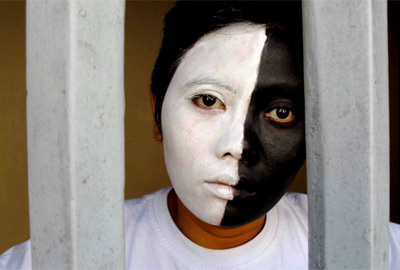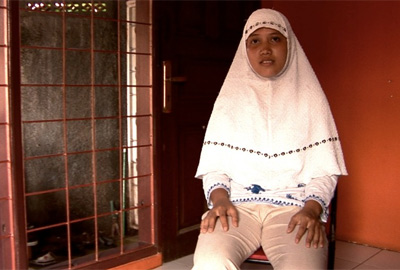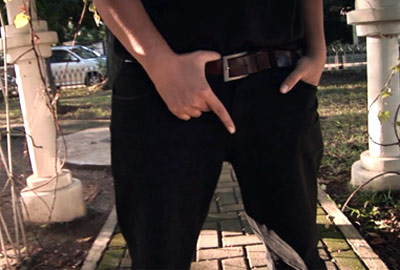Edith is a young, educated woman with a religious background questions ideas of God and religion while coming to terms with her sexuality. Turned out into the streets by her own family for being gay, Eggie found a new family among the the other street kids who shared her public bench on the streets of Yogyakarta. Hera, a mother of two, finds rejection by both men and lesbians as she comes out as a bisexual on the Internet.
Helmed by Laura Coppens, a German visual anthropologist, and with Berlin-based filmmaker Angelika Levi, Children of Srikandi (Anak-Anak Srikandi) is a collorative effort by eight first-time female filmmakers. The real-life stories are interwoven with traditional Indonesian wayang kulit (shadow theater) scenes that tell the story of Srikandi, a strong female warrior character of the Indian Mahabharata.
Like the character, the women in the film have learnt that the only way to survive in the world’s largest Muslim-majority nation is to become “female warriors” as they struggle to lead authentic lives and form a visible community despite persecution from hardline religious groups.
Fridae speaks with co-producers Laura Coppens and Angelika Levi, and co-director Yulia Dwi Andriyanti of the segment Edith‘s Jilbab about the challenges of making and distributing of the film; and gay acceptance in Indonesian society and by one’s family.
æ: Tell us more about the film and how it relates to the Javanese mythical character Srikandi.
Laura Coppens, co-producer and concept for the film: Srikandi is a female figure from the Indian Mahabharata epic that changes gender to live and fight as an equal among men. This character is a role model for eight highly personal perspectives on lesbian, bisexual and trans-identity life in Indonesia, the country with the world‘s largest Muslim population.
The film, which is a collective project, moves from personal essay into a radical conceptual exploration of queer politics and maps out self-confidently the situation in which a generation of women are beginning to find a voice. Making use of local forms of storytelling, the film also demonstrates that indigenous role models exist for strong women and alternative gender identities. Javanese shadowplay links and interweaves the different stories of the protagonists, but Anak-Anak Srikandi is goes far beyond being a typical episodic film.
æ: How did the concept for the film involving eight interlaced short films by as many female filmmakers come about?
Laura: For five years I’ve been programming Indonesian films for film festivals and in that function John Badalu invited me in 2009 to attend the Q! Film Festival, the Indonesian queer film festival. I talked to many people there and especially to queer women and many were complaining that there are not enough lesbian movies and especially no Indonesian productions. This gave me the idea to organise a film workshop and teach basic filmmaking skills, so they have the means to tell their own stories. But of course I could not do it on my own. I am not a trained filmmaker and I knew that I have to find professional help. This is when Angelika came into the picture. On the Indonesian part I approached in-docs, a Jakarta based organisation that organises documentary workshops to support the local film industry. They helped us to set up the workshop in Jakarta.
Angelika Levi, co-producer, workshop instructor and editor for the film: At the beginning of 2010, Laura asked me if I would like to direct a film workshop for young Indonesian lesbians in Jakarta over the summer. Her idea was to make an omnibus film with six to ten women presenting their personal experiences by means of autobiographic short films. In the end eight women stayed, each of them has an episode in the film. All filmmakers and producers of the Children of Srikandi Collective possess the same rights on the film. Our first joint meeting took place in Jakarta. Some of the women came from Yogyakarta or Bandung. All of them brought different social and religious backgrounds. Most of them had never met before.

Jlamprong. Life on the streets of Yogyakarta is no bed of roses.
A bench becomes your home and a witness to your life. The director
shares her difficult early years when family, police and fundamentalist religious
groups all turn against her because of her sexuality. In the end, it’s the street
kids who she first fought with that become her family. Director: Eggie Dian
æ: Is the film a documentary or fictional?
Laura: The film does not want to be categorised. It is neither, nor, but all together. In refusing to be put in a box, the film somehow reflects the vast (especially) gender variety that can be found in the world. There is not only man and woman, but a lot in between. The different characters in the film reflect this and show that gender and genre, as well as labels can be fluent.
Angelika: Anak-Anak Srikandi addresses the possibility to change. The film’s narrative structure does not always allow for a clear division of the films but works as a whole. And it’s also working with different genres ranging from poetic and political essay over Direct Cinema to fiction. Despite the different lengths of the films and the genres chosen there is no hierarchy. The assembly is based on an associative logic.
æ: Given the film's topic, getting funding must have been challenging?
Laura: It was hard to get funding, so we had to rely fully on the support from international foundations. From the German part we got support from Stiftung Umverteilen and the Manfred Durniok Foundation. We were very happy to get also a lot of support from the Indonesian part. The Jakarta International Film Festival and in-docs, which together form the Society of Indonesian Film Foundation, supported us in the first year. In the second year we also got money from the Global Fund for Women. Also my research program, the University Priority Research Program Asia and Europe at Zurich University supported the project with a bit of money. Since the post-production is the most expensive part in filmmaking and we had to seek external professional help for this highly technical process, we decided to start a crowdfunding campaign. Crowdfunding as a way to finance independent film productions, became highly popular in the United States and slowly finds its way in other parts of the world as well. Sometimes it is the only possibility to finance films like ours, which is a niche in a niche film. One day after our world premiere in Berlin we met our goal and finished the crowdfunding successfully.

Edith's Jilbab. The self-reflexive conversation of a young, educated
woman with a religious background, questioning ideas of God and
religion while coming to terms with her sexuality. Director: Yulia Dwi Andriyanti
æ: In a context of increasing opposition, threats and attacks against LGBT events in Indonesia by fundamentalist groups, what do you hope for the film to achieve?
Yulia Dwi Andriyanti, co- director : I hope that this film will be a way to open a critical dialogue about how the society perceives diverse sexual orientation, gender identity and faith as things that are usually taken for granted. I also hope that this film can break stereotypes about the binary opposition between sexuality and faith since both faith and sexuality take part in Indonesian society and are intersected with each other.
æ: What are the challenges facing lesbian and queer women in Indonesia today?
Yulia: As an individual, lesbian women face the typical standard of womanhood that exist in society, as a daughter, wife and also mother. It means that you will not be independent yet if you don’t marry. This is how society expects women to be. As part of a movement, lesbian women should put more voices to accommodate their interests through research, campaigns and advocacy so that they will be more visible in the identity movement, both as woman and lesbian.
æ: On the one hand we see groups like FPI going all out to condemn gay people and on the other, newspapers like The Jakarta Globe and the Jakarta Post regularly feature gay acceptance stories, what is the reality like on the ground and is there a significant difference in the large cities and more rural areas in terms of gay acceptance in society and by family?
Yulia: The level of gay acceptance in our society is very diverse. In my experience, young people tend to be more open for gay and lesbians rather than the older generation. In some religious universities or schools that I had visited, although they don’t accept homosexuality yet, they want to have homosexual friends.
For myself, it means that people still don’t accept it not because they don’t want to but they think that there is no homosexual who surrounds them and live the life as they are. In the level of family, some of experiences also told that parents tend to let their children to choose their life, including sexual identity, when they can be independent financially and also still play their role as children – a person who gives respect to parents.
One of my friends from a rural area in Yogyakarta doesn’t have problem with family acceptance since she is one of the breadwinner in the family. So, the acceptance depends on your position and status. Gay identity is always related to another identity that one has in society and family that may support or hinder her/him be accepted.
In regard to the condemnation of gay people by groups like FPI, I think that it can’t be generalised for all Islamic teaching. There are also Muslim figures that do ijtihad (a way to reinterpretate Qur’an through reasoning) on homosexuality issue, especially due to Sodom and Gomorrah text, such as Musdah Mulia and Kyai Husein. For me, it is important to learn the context of one verse before using it as a way to claim something.

No Label. Despite the queer community’s unwillingness, labels such as
butch and femme are commonly used, particularly in Jakarta. Although
many identify themselves within this labeling system, there are also
others who refuse to be categorised at all. Director: Afank Mariani
æ: Do you think distributing this film within Indonesia will be difficult? What are your plans?
Laura: I think in generally it is difficult to distribute independent films in Indonesia, especially documentaries. But we don’t seek for commercial distribution anyway, but to choose the locations and events where we want to screen our film carefully. For sure we will screen it at the Q! Film Festival in September in Jakarta. Together with the Q! and in-docs we also plan a tour in Java and hopefully also in other islands where we would like to present and discuss our film with the queer community, but also with other people in galleries or at university.
æ: Are there any other screenings of the film that have been confirmed?
Laura: Premiering our film at the Berlin International Film Festival, one of the biggest film festivals in the world, gave us a lot of attention and many international programmers have expressed interest in screening our film at their festivals. Our next screening will be at the CinemAsia Film Festival (4-8 April) in Amsterdam, and Tel Aviv (June 9-16). And we are especially proud that we just got the confirmation to present our film in June at Frameline, the oldest and biggest queer film festival in the world, in San Francisco (June 14-24).
Yulia Dwi Andriyanti is a coordinator of the Youth Interfaith Forum on Sexuality (YIFoS) where young people from diverse faith and sexual identity backgrounds can have dialogues and build friendship, learn from each other, share experiences and do collaborative works. YIFoS will organise its 1st Young Queer Faith and Sexuality Camp: “Building Peace through Diversity” from 10-14 April in Yogyakarta, Indonesia.
